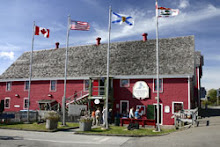Hello Everyone,
Every Nova Scotian coastal community owes some part of its history and prosperity to those who went fishing. Whether they worked from small inshore fishing boats or went to sea in schooners or trawlers, their life’s work meant prosperity for their villages and towns. The industry continues today and is just as important, although technology and the diminished fish stocks have changed the tenor of the activity.
Older fishermen often said, when pressed, that they did not like to talk to their families about the close calls that they had at sea. There was no point in worrying those at home and they were simply thankful to have survived.
Other stories became known, however, because of the extent of the tragedy that was involved. The fishermen did not live to come home; their loss made headlines, instead.
The August Gales that hit near Sable Island, in 1926 and 1927, took the lives of at least 138 Lunenburg-based fishermen. In total, six Lunenburg vessels were lost, with all hands. The tragedy did not confine itself to the Lunenburg area; devastation was felt all along the coastline.
In the August Gale of 1927, the last of the all-sail Gloucester schooners, Columbia, was lost at Sable Island. The crew of 22 were all from Nova Scotia, from the Queens County and Shelburne County areas.
One of the most poignant stories is that of Shelburne County crewman Allister Firth, who was just 17. He was lost with the rest of the crew, including his father, Arthur.
Young Allister did not want to go to sea that trip. He was a musician and wanted to play the violin. The family, however, was poor and the small wage that Allister could earn at sea was important. It became a source of great dispute between Allister and his father. On the day of sailing, the young lad hid in a closet in the home of a relative. His father found him, dragged him down the dock to the schooner, and threatened him that he had to go aboard Columbia and stay there. Arthur went and got their belongings and settled aboard the vessel.
Within weeks, the August Gale dealt crushing blows to the schooners caught in its grip. Columbia, with young Allister, was lost without a trace.
As a curious side-note, a few winters later, an American trawler was fishing in that area. It was night, but they were steaming along, when suddenly they caught hold of something heavy. The command was given to raise the trawl and, in the beam of light from the trawler, the crew was astounded to see the wreck of the schooner Columbia break the surface and pause for a few minutes. The lines then broke and the famous fishing and racing schooner dipped beneath the waves, for the last time.
The Fisheries Museum of the Atlantic, in Lunenburg, Nova Scotia, has a detailed exhibit about the August Gales of 1926 and 1927, with photographs of many of the men who were lost.
Wishing you Smooth Sailing,
Heather
Subscribe to:
Post Comments (Atom)

No comments:
Post a Comment